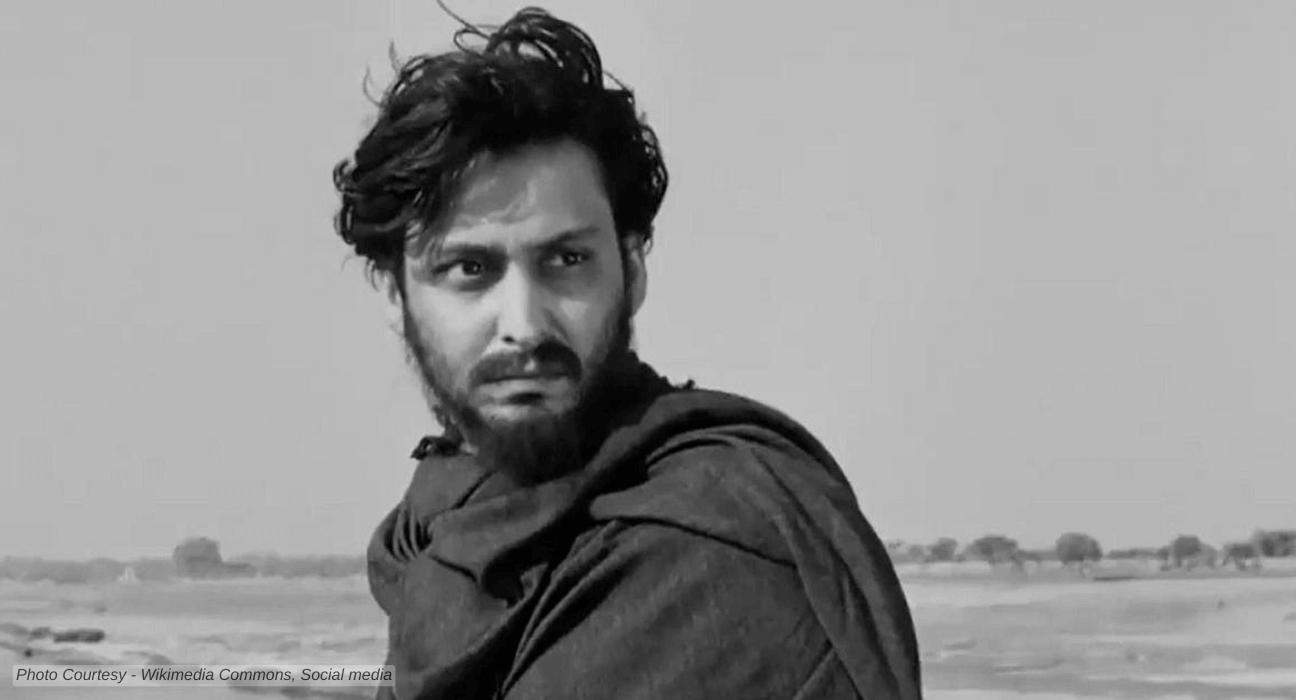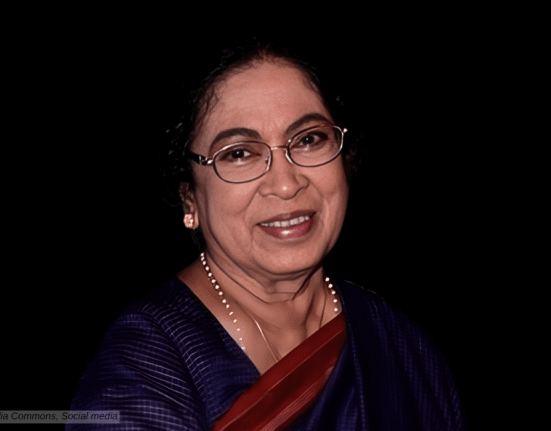Known for his unparalleled versatility and nuanced performances, Saumitra Chatterjee was a revered actor, play director, playwright, writer, thespian, and poet, celebrated for his remarkable contributions to Bengali cinema, theatre, and literature.
I think Just Remaining Alive is not a life. If You’re Not Being Culturally Alive. If You’re Not Being Creatively Alive. If You’re Not Being Critically Alive. Then you are not alive. To me that is not life. Then you are just physically alive. Which is priceless to me.
Saumitra Chatterjee, Anandabazar Patrika, 8 January 2018
Early Life
Born on Mirjapur Street (now Surya Sen Street) in Calcutta on August 19, 1935. His early years were spent in Krishnanagar, where he was deeply influenced by the town’s vibrant theatre scene. His father, a lawyer by profession, was also an amateur actor, which further fuelled Soumitra’s passion for the performing arts.
Soumitra graduated from City College, Kolkata, in Bengali literature and did his postgraduation at the University of Calcutta. While still a student, he learnt acting under noted actor-director of Bengali theatre Ahindra Choudhury and Sisir Bhaduri, the pioneers of modern Bengali theatre. While pursuing acting roles, he started working at All India Radio as an announcer.
Soumitra graduated from City College, Kolkata, in Bengali literature and did his postgraduation at the University of Calcutta. While still a student, he learnt acting under noted actor-director of Bengali theatre Ahindra Choudhury and Sisir Bhaduri, the pioneers of modern Bengali theatre. While pursuing acting roles, he started working at All India Radio as an announcer.
Saumitra Chatterjee as Apu
He tried for a role in Satyajit Ray’s Aparajito (1956), but Ray thought he was too old for the role. Intrestingly, his first screen test for the titular role of a 1957 Bengali film, “Nilachale Mahaprabhu,” was also a failure. One day when he was visiting the set of Ray’s next film Jalsghar (1958), Ray called him over and introduced him to actor Chhabi Biswas as “This is Soumitra Chattopadhyay; he’s playing Apu in my next film Apur Sansar (1959),” leaving him much surprised.
In Apur Sansar he was paired with Sharmila TagoreSoumitra Chatterjee’s portrayal of the adult Apu met with immense critical acclaim. The film marked the beginning of a long and fruitful collaboration with Ray.
Saumitra with Satyajit

After Apur Sansar, he also worked with Sharmila Tagore in a number of Ray’s films.
Over the years, Soumitra worked in fourteen films directed by Ray, including Abhijan (The Expedition, 1962); Charulata (The Lonely Wife, 1964); Aranyer Din Ratri (Days and Nights in the Forest, 1969); Ashani Sanket (Distant Thunder, 1973); Sonar Kella (The Fortress, 1974); and Joi Baba Felunath (The Elephant God, 1978) as Feluda, Ghare Baire (The Home and the World, 1984), and Ganashatru (Enemy of the People, 1989).
His portrayal of Feluda, the iconic detective in Ray’s films, endeared him to audiences across generations.
The Thespian – Saumitra Chatterjee
Soumitra first worked with Mrinal Sen in “Punasha (1961),’ which also starred Kanika Majumdar, Pahadi Sanyal, Kali Bannerjee, and Shefali Bannerjee. Mrinal Sen again cast him in “Pratinidhi (1965),” based on the novel Prachhadpat (The Cover) by Achintya Kumar Sengupta. The same year they came up with “Akash Kusum (1965),” where he played a middle-class man with a dream of making it big in business. The film tells the story of his desperate attempts to achieve success. They again collaborated in films like Joradighir Chowdhury Paribar (1966), Kanch Kata Hirey (1965), and Mahaprithivi (1992).
He also worked with the great Tapan Sinha in critically acclaimed films like “Kshudhita Pashan (1960),” “Jhinder Bandi (1961),” “Atanka (1986),” and “Wheel Chair (1994).” He also worked with Asit Sen in Swaralipi (1961), followed by Agun (1962).
In the romantic blockbuster “Teen Bhubaner Pare (1969),” he shared the screen with actress Tanuja. The film is still remembered for the exceptional chemistry between the lead pair and the classic songs “Hoyto Tomari Jonno” and “Jibone Ki Pabo Na.” He worked again with Tanuja in Prothom Kadam Phool (1969).
The Legendary Career
When we talk about Soumitra Chatterjee’s iconic chemistry, the first few names that come to mind are Sharmila Tagore, Madhabi Mukherjee, Sabitri Chatterjee, Supriya Devi, Sandhya Roy, Karuna Banerjee, Suchitra Sen, Aparna Sen, Debashree Roy, and many more. He also worked with the leading star actor of the period, Uttam Kumar, with whom he has often been compared, in eight films.
He paired with Suchitra Sen in Ajoy Kar’s Saat Pake Bandha (1963) with Suchitra Sen. The film recieved the Certificate of Merit at the 11th National Film Awards. The iconic film later remade by Anil Ganguli in Hindi as Kora Kagaz (1974).
Kar then cast him as Shekhar in Parineeta (1969), an adaptation of Sarat Chandra Chattopadhyay’s 1914 novel. He also gave a powerful performance in Tarun Mazumdar’s Sansar Simante (1975) and Ganadevata (1978), based on a novel by Tarashankar Bandopadhyay, where he played a negative role. Basanta Bilap (1973), Ashani Sanket (1974), Sansar Simante (1975), and Babu Moshai (1977) are some of his other notable films in that period.


Later Career
In the 1980s, he continued to give memorable performances in films like Agradani (1983), directed by Palash Bannerjee, Kony (1986), directed by Saroj Dey, and Agnisanket (1989), directed by Aroop Dutta.
He also received critical acclaim for his directorial debut, Stree Ki Patra (1986), which was based on the Bengali short story Streer Patra by Rabindranath. His next film as a director was Mahasindhur Opar Hote in 1988.
In the 90s, he started working with contemporary directors, like Goutam Ghose (Dekha, 2000; Abar Aranye, 2003; Shunyo Awnko, 2013), Aparna Sen (Paromitar Ek Din, 2000; 15 Park Avenue, 2005), Anjan Das (Saanjhbatir Roopkathara, 2002; Banshiwala, 2010; Faltu, 2011), and Rituparno Ghosh (Asukh, 1999).
Some of his later films include Suman Ghosh’s Podokkhep (2006), Sekhar Das’s Krantikaal (2006), Atanu Ghosh’s Rupkatha Noy (2013), and Mayurakshi (2017). In a career spanning 60 years, he steadfastly refused to work in Hindi films like his Bengali contemporaries, turning down offers from the likes of Shyam Benegal and Govind Nihalani.
Awards and accolades
Throughout his illustrious career, Chatterjee received numerous Awards anb accolades. He is the winner of 3 National Awards, 8 Bengal Film Journalists’ Association Awards, and 7 Filmfare Awards (East & South). Chatterjee gets the Filmfare Lifetime Achievement Award in 1995. He also 2 Sangeet Natak Akademi Awards (1998, 2012), the Padma Bhushan (2004), and the Dadasaheb Phalke Award in 2012.
Soumitra Chatterjee was the first Indian film personality to be conferred with the Commandeur de l’Ordre des Arts et des Lettres, France’s highest award for artists.
The Literary Genius
Beyond the realms of cinema, Chatterjee’s stage performances and poetry recitations showcased his multifaceted artistic prowess. Soumitra was also a poet, playwright, and theatre director, showcasing his multifaceted talent. Soumitra was a close friend and mentee of Sisir Bhaduri, a doyen of Bengali theatre. He returned to theatre with his production “Naam Jiban” in 1978 after a journey of 20 years in Tollywood. Some of his other notable plays include Rajkumar (1982), Phera (1987), Nilkantha (1988), Ghatak Biday (1990), Nyaymurti (1996), Tiktiki (1995), Homapakhi (2006), and Raja Lear (2010), based on King Lear by William Shakespeare.
Besides publishing over 12 poetry books, he also published 3 drama collections and multiple other books. In 2014, he published a memoir of his time with Satyajit Ray by the name of “Manikdar Sange (With Manik Da).” He also wrote a memoir, “Agrapathikera (Pioneers; 2010),” about his seniors and friends who he met in his long journey. He also wrote a book on “Pratidin Taba Gatha (You Sing Everyday, 2009)” on the life and time of Rabindranath Tagore.
Personal Life
Soumitra Chatterjee married Deepa Chatterjee in 1960, and the couple had two children, Saugata and Poulomi. Despite his immense popularity, Soumitra led a relatively private life. He was known for his humility and dedication to his craft. Soumitra passed away on November 15, 2020, due to complications from COVID-19, leaving behind a legacy that continues to inspire generations of actors and filmmakers.
His demise marked the end of an era, leaving behind a void that is deeply felt in the world of Indian cinema. Saumitra Chatterjee’s legacy lives on through his body of work, which continues to resonate with audiences who appreciate the subtleties of his craft. His ability to bring depth to characters, coupled with his distinctive baritone voice, made him a cultural icon.
Saumitra Chatterjee on IMDB









